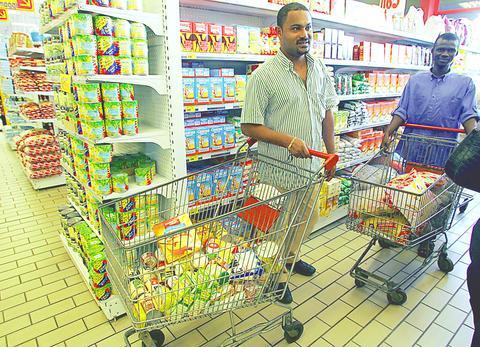Staring with tears in their eyes, Ivory Coast's people emerged from their homes to survey the wreckage of five days of violent upheaval -- and stock up with food against any feared next round.
France and some other Western nations flew out hundreds of their nationals Thursday in a second day of evacuations as South Africa convened urgent talks in a crisis it warns could destabilize West Africa.

PHOTO: AFP
The commercial capital, Abidjan, experienced the first day of calm since anti-foreigner mobs took to the streets last Saturday after a sudden, deadly clash between Ivory Coast forces and its former colonial ruler, France.
Some shops reopened and traffic returned to streets strewn with charred vehicles and the remnants of roadblocks. Residents crowded supermarkets and waited in long lines to draw cash from ATMs.
A woman stood horrified amid the burned-out wreckage of a French bookstore with tears welling in her eyes. Employees at an Ivorian frozen-foods company found the doors kicked in and the freezers emptied.
"They took everything, even the carpet," a delivery man said, too afraid to give his name. "Our entire future is in question. A boss can't pay people who can't work any more."
Once one of West Africa's most prosperous and stable countries, Ivory Coast has been riven by instability since a 1999 military coup ignited ethnic and regional tensions between the predominantly Muslim north and mostly Christian and animist south.
France, with some 14,000 citizens here, sent helicopters on Wednesday to pluck foreigners from villages and bring them to Abidjan's international airport, still crowded on Thursday with frightened families waiting for flights out.
A 15-year resident cradling her baby in the departure hall said she had just minutes to decide whether to stay or go when French soldiers swooped into Jacqueville, about 40km west of Abidjan.
"I grabbed my baby and I grab-bed by photo album and I jumped in the helicopter," said the French woman, who gave her name only as Caroline.
The violence began when Ivory Coast warplanes killed nine French peacekeepers and an American aid worker in an airstrike last Saturday on the north during three days of government bombardments that violated a 2003 ceasefire in a now two-year-old civil war.
Within hours, France had wiped out the nation's newly built-up air force, sparking an uprising by loyalist youths who took to the streets with machetes, iron bars and clubs.
The mayhem, driven by President Laurent Gbagbo's fiercely patriotic supporters and checked only intermittently by his government, has been condemned by fellow African leaders and drawn moves toward UN sanctions.
UN Secretary-General Kofi Annan reiterated his call to all parties to end the violence and condemned "the use of hate media which is fueling the tensions, xenophobia and inciting violent acts," UN spokesman Fred Eckhard said Thursday at UN headquarters in New York.
"He reminds all concerned that they may be held accountable for their acts, in conformity with international criminal, human rights and humanitarian law," Eckhard said.
South African President Thabo Mbeki opened talks Thursday in Pretoria with the country's political representatives, including opposition leader and former Prime Minister Alassane Ouattara.

PRECARIOUS RELATIONS: Commentators in Saudi Arabia accuse the UAE of growing too bold, backing forces at odds with Saudi interests in various conflicts A Saudi Arabian media campaign targeting the United Arab Emirates (UAE) has deepened the Gulf’s worst row in years, stoking fears of a damaging fall-out in the financial heart of the Middle East. Fiery accusations of rights abuses and betrayal have circulated for weeks in state-run and social media after a brief conflict in Yemen, where Saudi airstrikes quelled an offensive by UAE-backed separatists. The United Arab Emirates is “investing in chaos and supporting secessionists” from Libya to Yemen and the Horn of Africa, Saudi Arabia’s al-Ekhbariya TV charged in a report this week. Such invective has been unheard of

US President Donald Trump on Saturday warned Canada that if it concludes a trade deal with China, he would impose a 100 percent tariff on all goods coming over the border. Relations between the US and its northern neighbor have been rocky since Trump returned to the White House a year ago, with spats over trade and Canadian Prime Minister Mark Carney decrying a “rupture” in the US-led global order. During a visit to Beijing earlier this month, Carney hailed a “new strategic partnership” with China that resulted in a “preliminary, but landmark trade agreement” to reduce tariffs — but

Chinese President Xi Jinping’s (習近平) purge of his most senior general is driven by his effort to both secure “total control” of his military and root out corruption, US Ambassador to China David Perdue said told Bloomberg Television yesterday. The probe into Zhang Youxia (張又俠), Xi’s second-in-command, announced over the weekend, is a “major development,” Perdue said, citing the family connections the vice chair of China’s apex military commission has with Xi. Chinese authorities said Zhang was being investigated for suspected serious discipline and law violations, without disclosing further details. “I take him at his word that there’s a corruption effort under

China executed 11 people linked to Myanmar criminal gangs, including “key members” of telecom scam operations, state media reported yesterday, as Beijing toughens its response to the sprawling, transnational industry. Fraud compounds where scammers lure Internet users into fake romantic relationships and cryptocurrency investments have flourished across Southeast Asia, including in Myanmar. Initially largely targeting Chinese speakers, the criminal groups behind the compounds have expanded operations into multiple languages to steal from victims around the world. Those conducting the scams are sometimes willing con artists, and other times trafficked foreign nationals forced to work. In the past few years, Beijing has stepped up cooperation